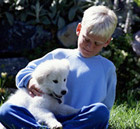Inspirational Articles
Featured Articles
 The Nature of Love: How Love Behaves
The Nature of Love: How Love Behaves
By Dr. Monte Wilson
What strikes me about Paul’s description of love in I Corinthians 13 is that it is all about how love behaves. There is nothing here about the subjective experiences we usually think about when speaking of the nature of love. This is not to suggest that feelings are not an ingredient of love, only that as far as Paul was concerned feelings were not the primary or defining ingredient. I actually don't think it is possible to behave as love demands and not end up with loving-feelings.
 Here is how love does not behave:
Here is how love does not behave:
- It does not envy
- Doesn’t strut around saying look at me
- Is not prideful (“Look how loving I am.”)
- Is never rude – Love has manners: it offers itself but never forces itself.
- It is not out for itself, is not self-seeking: it never says, “What about me and my needs?”
- Doesn’t get provoked (isn’t thin-skinned), and doesn’t keep lists of wrongs suffered
- It thinks no evil, and certainly does not rejoice when evil takes place (This includes not wanting to sit around and always talk about the evil in our denomination, in that movement, or in his house.)
 How does love behave?
How does love behave?
- Love suffers long, bearing all things
- Love is kind
- Love rejoices in the truth
- Love believes the best
- Love hopes the best
- Love endures
Love…believes all things…hopes all things…endures all things.
I think this about sums it up.
Love believes all things
Love’s first instinct is to believe others, to trust them, to trust what they are saying. This doesn’t mean that love is blind or naïve, only that it is by nature trusting rather than cynical or skeptical.
Love hopes all things
Love is positive and hopeful, big hearted and open. Love is always ready to forgive and give people a second chance. Love hopes for the best in and for others.
 Love endures all things
Love endures all things
Love perseveres. Love bears the rejection of the Prodigal, allowing him to leave and then searching the horizon everyday for his return. Love leaves the ninety-nine for the one. Love goes to the cross for the sake of others.
Why does God love us? I certainly do not think it is because we are that loveable. He loves because that is who he is. Our love must increasingly mirror the love of God. As with God’s love, we don’t base our love for others on who they are or what they do, but, rather, love because it is who we are.
Who We Are
- About Us
- Why God On the Net
- Contact Us
- Privacy Statement
- Ten Ways This Site Can Change Your Life
- Why We Are Able To Help